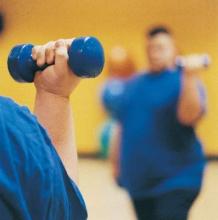Reductions in abdominal obesity were similar in patients who exercised for fixed amounts of time at different levels of intensity, but significantly greater than non-exercise controls, Dr. Robert Ross and co-authors at the Queen’s University School of Kinesiology and Health Studies, Kingston, Ontario, reported.
In a study of 300 abdominally obese adults, reductions in waist circumference were greater in all three exercise groups — low-amount, low-intensity (-3.9 cm; p < .001); high-amount, low-intensity (-4.6 cm; p < .001); and high-amount, high intensity (-4.6 cm; p < .001) — than in controls, but did not significantly differ between groups. However, 2-hour reductions in glucose level were significantly higher in the high-amount, high-intensity exercise group (-0.7 mmol/L; p = .027) compared with the controls than in all other groups, the investigators reported.
The study results are “encouraging and provide treatment options for clinicians who seek lifestyle-based strategies for reducing abdominal obesity in adults at increased health risk,” Dr. Ross and his colleagues wrote in the paper.
Read the full article at: http://www.annals.org/article.aspx?doi=10.7326/M14-1189.


